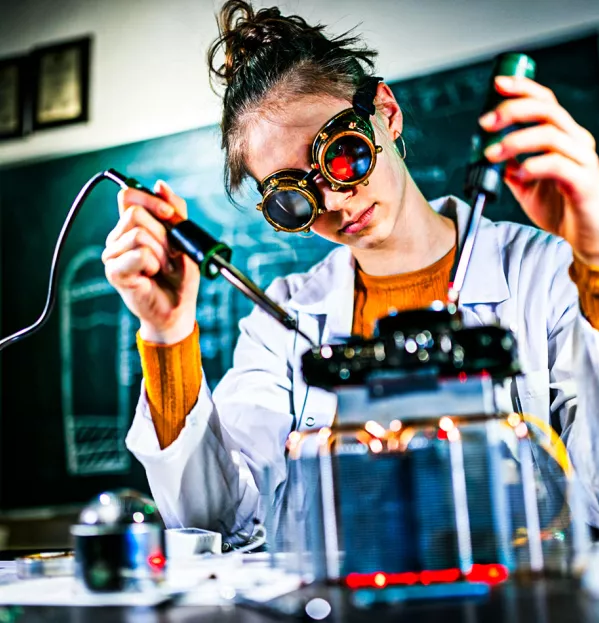
- Home
- Teaching & Learning
- Secondary
- How science experiments can boost your GCSE revision
How science experiments can boost your GCSE revision

âAre we doing a practical today?âÂ
Itâs a question that students often ask me as they arrive at my classroom door, ready for their chemistry lesson.
Thatâs not surprising, given that practical science provides the opportunity for that âwowâ moment that will captivate studentsâ attention. After 26 years of teaching chemistry I still get excited to show my students the wonder of the iodine clock reaction (in which a colourless solution suddenly turns dark blue), or to impress them by setting fire to methane bubbles in my hands.
Students clearly enjoy this aspect of the subject. Yet, when it comes to GCSE science revision, sessions often wind up being dry, âhands offâ and text-based. Why is this?
The case for practical revision
Experimentation is at the very heart of science. Itâs what sets our subject apart from others, and underpins the scientific method.
Whatâs more, students learn by seeing and doing. David Kolbâs four stages of experiential learning - concrete experience, reflective observation, abstract conceptualisation and active experimentation - can serve as a blueprint for a science practical lesson, helping our students to acquire knowledge for themselves in a way that leads to more long-lasting knowledge acquisition.
Some of the abstract concepts that we teach in science can be much easier to grasp with a whole-class practical or a teacher demonstration.
Consider a topic such as electrolysis. It can be hard for students to understand the key components of an electrolytic cell simply from seeing it on a PowerPoint slide. But, if students are given the chance to set up an electrolytic cell for themselves, theyâre likely to have a more secure understanding of what an anode and cathode are, and will have seen for themselves how the compound is split up into its component elements.
When students see the copper forming seemingly from nowhere during the electrolysis of copper sulfate solution, they naturally want to know why and where it has magically appeared from. Practical science, then, taps into studentsâ natural curiosity.
Harnessing the power of video
Knowing all this, when I started my YouTube channel and TikTok account Revise Chemistry with Mr B (which has gone on to win a award from the education charity ) I was surprised to find that most of the revision content that was already available to students did not feature a single live practical.
In my science lessons, I firmly believe there are sound pedagogical reasons for including as many practical opportunities as possible, so I was determined that I would have the same philosophy for my online resources.
And this seems to have gone down well with students. In response to a YouTube video I made about phytomining (in which plants are used to extract heavy metals from soil), a student commented: âThank you so much for this Mr B! Now I can visualise what this process actually looks like.â
Not just a luxury
I can understand why some teachers may favour a more theory-based lesson, particularly when it comes to revision. There is always so much content to get through that practical work can seem like a luxury.
With a challenging group of students it may also be easier to manage their behaviour when they are sitting at their desks. The irony is that challenging classes may benefit the most from practical work in terms of increasing their motivation and helping them to gain knowledge through experiential learning.
Safety during practical work may be a further concern when youâre arming students with potentially dangerous equipment such as Bunsen burners, scalpels or harmful chemicals.
These concerns will be magnified if you are one of the increasing number of teachers who find themselves being asked to teach science when it is not your specialist subject. Or it could be that youâre recently qualified and donât have such a wide repertoire of practical ideas as someone who has been teaching for several decades.
Overcoming barriers
If this is the case and you want to incorporate more practical work into lessons, my advice would be to buddy up with a colleague in your department and go and watch any practicals that you havenât done before.
If arranging cover for your own class is a problem, then take a look at the videos on my YouTube channel Revise Chemistry with Mr B, or for more details on specific experiments, get in touch with me, using the contact details listed there.
If our body of scientific knowledge is to keep advancing in the future, todayâs students must understand the importance of the scientific method and the role of practical work within that.
But on a more day-to-day level, wouldnât it be wonderful if our students had a deeper understanding of the scientific concepts that will help them to succeed in their GCSE exams and, dare I say it, make science revision enjoyable?
Jon Blackbourn is a chemistry teacher at Fairfield High School for Girls in Droylsden in Manchester, and runs the YouTube channel Revise Chemistry with Mr B
Want to keep reading for free?
Register with Tes and you can read five free articles every month, plus you'll have access to our range of award-winning newsletters.
Register with Tes and you can read five free articles every month, plus you'll have access to our range of award-winning newsletters.
Keep reading for just ÂŁ4.90 per month
You've reached your limit of free articles this month. Subscribe for ÂŁ4.90 per month for three months and get:
- Unlimited access to all Tes magazine content
- Exclusive subscriber-only stories
- Award-winning email newsletters
You've reached your limit of free articles this month. Subscribe for ÂŁ4.90 per month for three months and get:
- Unlimited access to all Tes magazine content
- Exclusive subscriber-only stories
- Award-winning email newsletters
topics in this article



